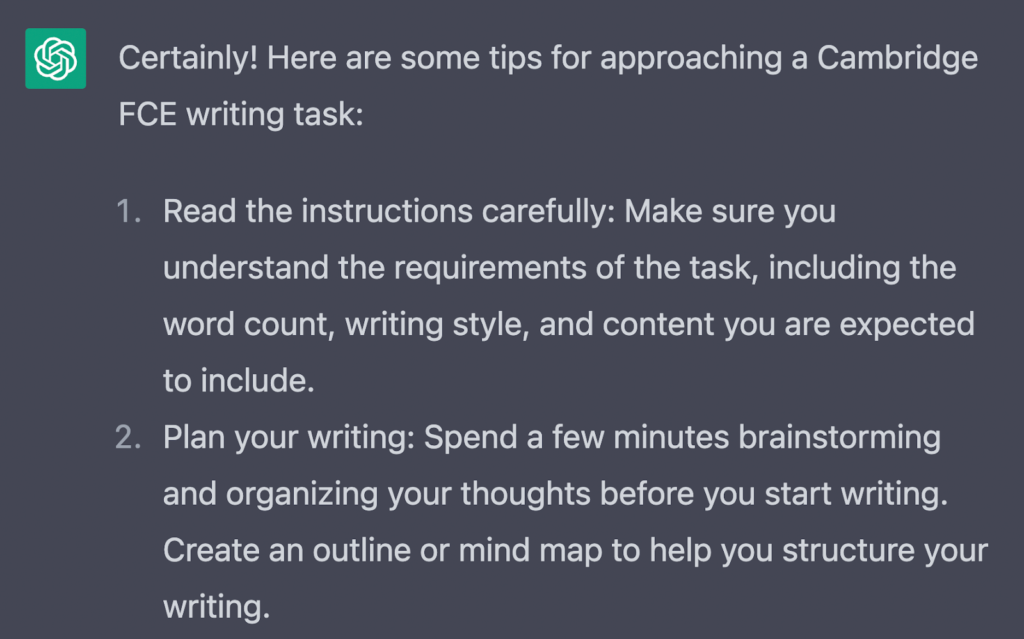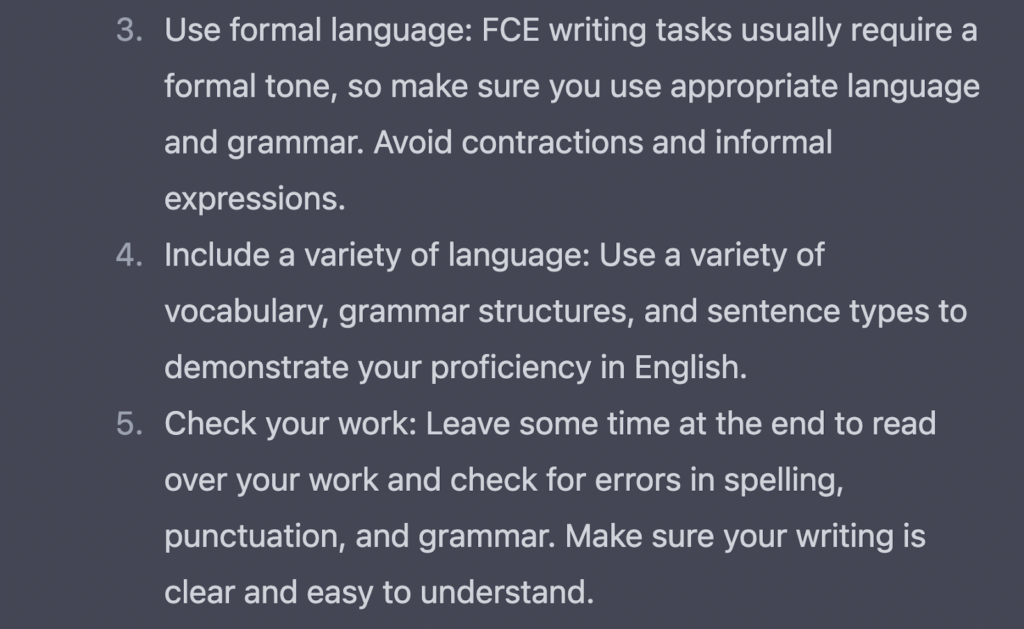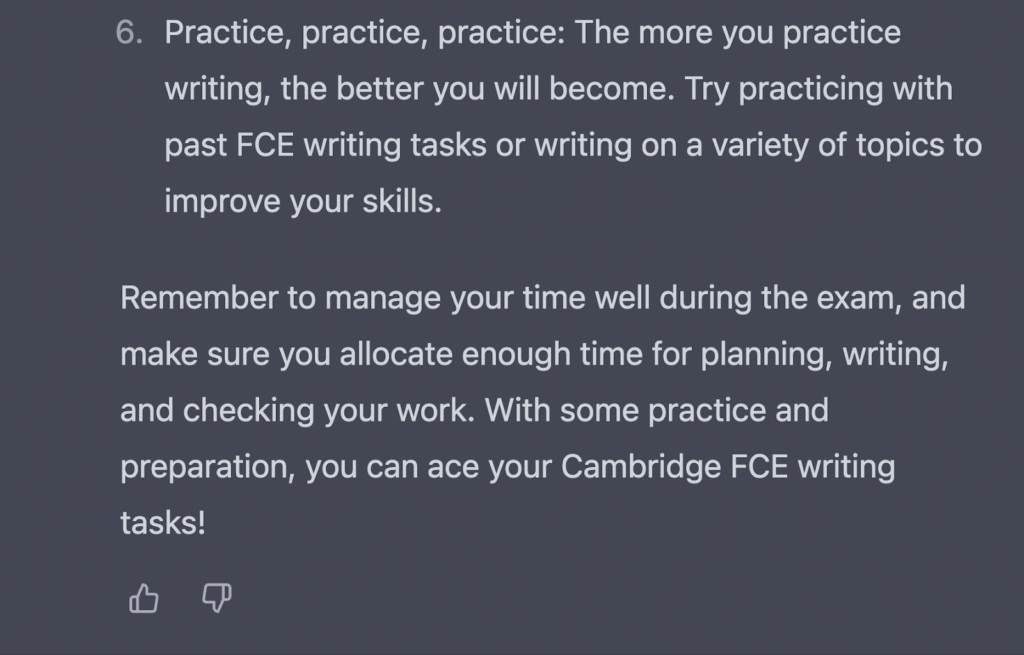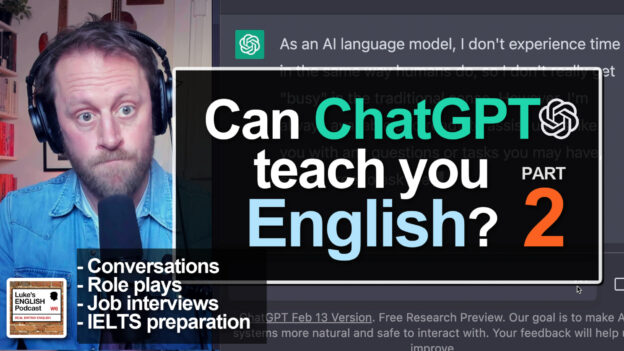In this series I am evaluating ChatGPT as a language-learning tool. In this part I’m experimenting with role-play conversations, job interview practice, creating texts and dialogues and seeing if it can help you prepare for Cambridge exams like IELTS or CAE.
DOWNLOAD THE PDF TRANSCRIPT FOR 822. ChatGPT & Learning English PART 2
Episode Transcript
Hello listeners,
This is part 2 of a 3-part episode in which I am playing around with ChatGPT in order to see how it can help you learn English.
ChatGPT is a sophisticated AI chatbot. You can ask it questions and give it commands and it responds instantly. This is the most advanced AI chatbot I have ever used and it is quite impressive how it can do so many different tasks. We’re all finding out how we can use it and how it can be useful as a time-saving tool for many things, including learning and teaching English.
Of course ChatGPT is not without its critics. Some of those criticisms include the fact that ChatGPT will probably encourage cheating and will make it harder for institutions like schools to detect cheating. Noam Chomsky the well-known linguist and intellectual has described it as high-tech plagiarism, because it essentially regurgitates other people’s work and doesn’t provide citations or sources for the information it provides, and also people are suggesting that ChatGPT or AI in general could ultimately lead to a lot of people losing their jobs.
Does that include me, and other English teachers like me? Can ChatGPT replace English teachers, content creators or even the need to practise English with humans at all?
I’m not entirely sure, and we’re all working these things out at the moment, since this is perhaps the first time this kind of technology has been so accessible and now everyone’s using it, learning about it and thinking about it.
There are very interesting debates about this going on, but in this episode I’m focusing mainly on things you can do with ChatGPT, seeing how it works, and evaluating it’s effectiveness as a language learning tool.
This is part 2. In part 1 of this I asked it to create a study plan as if I was an upper-intermediate learner of English, which it instantly wrote for me. The advice was presented very clearly and a lot of it was pretty decent advice at first glance, but was it appropriate advice for the learner profile I wrote? Was the information a bit generic? What experience or research was its advice based on? We don’t really know.
Then I checked its ability to correct English errors and to explain those corrections, which it seemed to do quite well, although it lacked the ability of a human teacher to see the bigger picture and to use emotional intelligence, and then I started testing its ability to have a natural conversation, which it struggled with – mainly because as an AI language model it doesn’t have any feelings or opinions of its own and apparently these things are absolutely vital elements for a good conversation.
But is it possible to persuade ChatGPT to forget that it’s an AI chatbot and to pretend to be someone else, like a celebrity that you’d like to chat to, or your English teacher who can correct your errors while you chat?
This is what we’re looking at in part 2 here.
Also, coming up are these questions:
- How well does it handle role plays in order to let you prepare to use English in specific situations?
- Can you simulate job interview situations with it?
- Can it create useful texts or dialogues for studying with?
- Can it help you with exam preparation by providing sample written texts in response to FCE or CAE writing tasks?
- Can it give you good advice for doing Cambridge exams?
- Can it create reliable, useful exam practice tasks to help you prepare for IELTS?
Well, let’s find out now as we continue to play around with ChatGPT. By the way, there is a PDF script for all the things I am saying in this episode, including all the prompts I am using. You can get it on the page for this episode on my website – link in the description. If you are watching on YouTube you will see the text on the screen and I recommend that you watch this in full screen mode so you can see the text more easily.
OK, so let’s continue and here we go…
Conversation role plays for specific situations
If you need practice of using English in certain specific situations, you can ask it to help you.
I am a hotel receptionist. Can you help me deal with customer complaints?
It just gave me advice, like an article about how to deal with customer complaints.
You can ask it to create sample dialogues for you, for different situations.
Can you make a dialogue between a hotel receptionist and a customer making a complaint about their room?
It creates a pretty good model dialogue. The language you can see is professional, and polite and a good example of the kind of English you would need in that situation.
ChatGPT is good at this kind of thing. But, as a teacher in class, I might want to make sure this dialogue contained certain target language which I want to present and practise.
Again, there isn’t a brain there looking at the bigger picture, guiding you, interpreting your needs and reactions, anticipating and planning as it prepares learning materials and activities for you.
Conversation can be hard to maintain.
You need to give it very specific instructions if you want to converse with it. Otherwise it will just generate a dialogue.
Let’s do a roleplay. You pretend to be a hotel customer with a complaint, and I will be the receptionist. Can you also correct my English errors during the roleplay?
It just created the dialogue, writing lines for both people.
Let’s see what happens if I re-write the prompt more specifically.
Let’s do a roleplay. You pretend to be a hotel customer with a complaint, and I will be the receptionist. I will start by writing “Hello, can I help you”. Then give your response and wait for me to reply before writing the next line.
Can you also correct my English errors during the roleplay?
It’s very difficult to persuade it to do this.
Job interview role plays
Can you interview me for a job as a TEFL teacher at a new language school in Paris?
This worked quite well. It generated questions one after the other. It also responded when I asked for clarification.
Let’s see it it can help you prepare for an interview for a specific position.
Can we do a job interview role play? I’ll input a job advertisement and can you then interview me for the position?
You can input all the details from a job advertisement.
Just paste all the text from an online job advert, like “Marketing manager job advert” or “TEFL teacher France job advert” or “Podcast host job advert”
Inputting a large amount of text can confuse ChatGPT and it tends to just summarise the text. But then you can say “Ask me interview questions based on the job description I gave you”.
It should ask you some pretty good questions, relevant to that job, which will allow you to simulate the interview on your own, or at least prepare some answers. You could type your answers into ChatGPT and ask it for feedback.
But beware of just practising English through typing. Don’t forget that in the real world you have to speak spontaneously and you have to use social skills while doing it including things like body language.
Sample dialogues or texts
Ask it to produce sample texts or sample dialogues which you can then study with.
To be fair, this isn’t really necessary as there are so many texts and resources already available for you, including ones which are specifically created to help you learn English, but yes they are in published books and materials that you might not have immediate access to. Also, it’s simple to just go to ChatGPT and ask it to create any text or dialogue you want, following your specific instructions.
Can you write a 300 word text containing useful phrases for talking about using the toilet?
No speaking: Remember, Chat GPT won’t “say” any of these sentences because it is only in text form.
Can you create a 200 word story to present the use of narrative verb tenses in English?
What I want from this is a range of verb tenses. Past simple, past continuous, past perfect, with good clear examples of how those forms are used and how they are different to each other.
Did it do that?
Was it a good story?
Can it help with Cambridge Exam test preparation?
Let’s see if it can do a Cambridge First Certificate writing task.
Sample answers can help us to practice our writing by providing a model which we can learn from.
Let’s input a task directly into ChatGPT.
CAE Writing Part 1
You have received this email from your English-speaking friend David.
From: David
Subject: touring holiday
Some college friends of mine are visiting your area soon for a week’s touring holiday. They would like to travel around and learn about your local area and its history.
Can you tell me about some of the places they could visit? What’s the best way to travel around – car, bike or coach?
Thanks,
David
Write your email.
Write 140 – 190 words in an appropriate style.
| Dear David, It’s great to hear from you! I’d be happy to give some recommendations for your college friends’ touring holiday in our area. There are plenty of places to visit and explore around here. If your friends are interested in history, I would suggest they start with a visit to the local museum, which houses exhibits on the area’s past, including its early settlements and industrial heritage. Another must-visit is the old castle, which is one of the most famous landmarks in the region. Your friends can take a guided tour of the castle to learn about its history and its role in the area’s development. As for the best way to travel around, I would recommend a car. There are several car rental agencies available in the area, and it’s an efficient and flexible way to travel and explore. However, if they are more comfortable with public transport, there are several coach tours available that take visitors around to the most popular sites. I hope your friends enjoy their time here and get to experience everything that the area has to offer. Let me know if there’s anything else I can help with. Best regards, [Your Name] |
Can you give me some advice on how to do a Cambridge FCE writing task, like the one I gave you?



The answer was pretty good but it got some things wrong.
- It said that I should use a formal tone, but this isn’t always the case.
- The email to David shouldn’t be formal. In fact this advice contradicts what it did in the writing task. It used some informal language there.
- It didn’t refer to any assessment criteria.
- I’m not sure ChatGPT is consistent or reliable enough to replace proper English language teaching.
Ask it to create IELTS practice tests
I asked it:
Can you create an IELTS reading section 3 practice test?
It created a test which looked good at first glance, but it was not a proper section 3 reading test.
The test format was different and did not follow the true, false, not given format of IELTS part 3.
So this means it is not providing sufficient practice for IELTS reading section 3.
Each part of IELTS is specifically designed to test different reading skills and each reading test is very carefully created to test those skills.
Chat GPT didn’t do this to the same standard as you would find in proper IELTS test preparation materials.
Part 2 ending
That is where we are going to stop part 2.
I hope you’re enjoying these episodes and finding them useful.
Don’t forget to leave your comments in the comment section if you have something to say.
We are going to continue in part 3 of this episode, which will be available soon. In fact it might be available for you now – check the episode description for links.
In part 3 I will be attempting to get answers to these questions:
- Can you use ChatGPT like a dictionary?
- Can it give us the same information about words that we can find in a good dictionary?
- Can it give us correct definitions, information about parts of speech, pronunciation, example sentences, synonyms, antonyms, collocations?
- Can it provide information about the etymology of words and phrases?
- Can it transcribe things into phonemic script?
- Does it accurately transcribe things into British English pronunciation or is it just standard American?
- Can it convert between different dialects of English, e.g. will it convert American English into British English, or into specific dialects of British English?
- Is it able to help us to use the right sentence stress, word stress, pausing and intonation when reading things out loud?
- Can it help us practise grammar by creating quizzes or tests? Are those tests reliable?
- Can it help you to remember vocabulary with tests and quizzes?
- Can it help you remember words and spelling with mnemonic memory devices?
- Can it create text adventure games?
- Can it adapt its English to different levels?
- What are my overall thoughts and conclusions about ChatGPT?
All of that, coming up in part 3!
End of part 2











